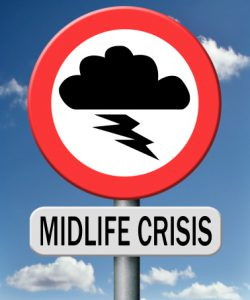The idea of a “midlife crisis” in popular culture is when you do outrageous, impractical things such as straying from your marriage, buying sports cars or impulsively quitting you job.
A midlife crisis is better known as a midlife transition to mental health experts, who say this time in a person’s life is sometimes accompanied by depression.
The key is to realize when your transition is developing into depression.
Some signs that your midlife transition may be rooted in depression are:
- Extreme change in eating habits
- Consistently fatigued and exhausted
- Change in sleeping patterns
- A feeling of hopelessness, guilt or worthlessness
- Irritable, restless or unexpected bouts of anger
- Thoughts or attempts of suicide
- Decrease or increase in desire and ambition
- Compulsion for alcohol or drugs
- Desire for a sexual affair
- Feeling overwhelmingly trapped by responsibilities, such as
financial, family and job - Consistent desire to run away from responsibilities
- Doing things out of character that could lead to trouble
Studies have shown that 88% of Americans who are experiencing depression during their midlife transition have reported difficulty at work, home or with otherwise simple social activities. Unfortunately, only 35% of them had seen a mental health professional for support or treatment.
A midlife transition can be one of the most stress-filled phases in your life’s journey. Seeking the assistance from a mental health professional during this time can save relationships, finances and other aspects of your life.
If you are experiencing the symptoms of a midlife transitional depression, call for an appointment at the Flushing Hospital Medical Center’s Mental Health Center. For more information or to make an appointment, call 718-670-5486.
All content of this newsletter is intended for general information purposes only and is not intended or implied to be a substitute for professional medical advice, diagnosis or treatment. Please consult a medical professional before adopting any of the suggestions on this page. You must never disregard professional medical advice or delay seeking medical treatment based upon any content of this newsletter. PROMPTLY CONSULT YOUR PHYSICIAN OR CALL 911 IF YOU BELIEVE YOU HAVE A MEDICAL EMERGENCY.

